#Becky Kenneth
Explore tagged Tumblr posts
Text




#CampbellQuayBaCC#Campbell Quay#CampbellQuay#The Sims 2#TS2#BaCC#Build a City Challenge#The Sims 2 BaCC#Townie Household#Townie Round 2#Spring: First Year#Becky Kenneth#Luke Lycan#First time they've seen each other since he moved out#which has been months btw
8 notes
·
View notes
Text
A Blue in Venice, A Haunting in Beetle
A Blue in Venice, A Haunting in Beetle
CREDIT: DC, Screenshot/20th Century Studios, Screenshot Blue Beetle: Starring: Xolo Maridueña, Adriana Barraza, Damián Alcázar, Raoul Max Trujillo, Susan Sarandon, George Lopez, Elpidia Carrillo, Bruna Marquezine, Belissa Escobedo, Harvey Guillén, Becky G Director: Ángel Manuel Soto Running Time: 127 Minutes Rating: PG-13 Release Date: August 18, 2023 (Theaters) Continue reading Untitled

View On WordPress
#A Haunting in Venice#Adriana Barraza#Ali Khan#Ángel Manuel Soto#Becky G#Belissa Escobedo#Blue Beetle#Bruna Marquezine#Camille Cottin#Damián Alcázar#Elpidia Carrillo#Emma Laird#George Lopez#Harvey Guillén#Jamie Dornan#Jude Hill#Kelly Reilly#Kenneth Branagh#Kyle Allen#Michelle Yeoh#Raoul Max Trujillo#Riccardo Scamarcio#Rowan Robinson#Susan Sarandon#Tina Fey#Xolo Maridueña
1 note
·
View note
Text
Never Enough (2023) – Nollywood Movie Download
A woman desperately proposes to her boyfriend who faults at reciprocating her feelings. She leaves him to take refuge in a romantic sleigh ride with an emotionally damaged employer. Mp4 Download Never Enough (2023) – Nollywood Movie 720p 480p , Never Enough (2023) – Nollywood Movie , x265 x264 , torrent , HD bluray popcorn, magnet Never Enough (2023) – Nollywood Movie mkv Download VIDEO…

View On WordPress
0 notes
Text

A Simple Plan will be released on 4K Ultra HD and Blu-ray on November 19 via Arrow Video. Matt Griffin designed the new cover art for the 1998 Academy Award nominee; the original poster is on the reverse side.
Sam Raimi (The Evil Dead) directs the neo-noir crime thriller from a script by Scott B. Smith (The Ruins), based on his own 1993 novel of the same name. Bill Paxton, Billy Bob Thornton, and Bridget Fonda star.
The film has been newly remastered in 4K from the original negative, approved by Raimi, with Dolby Vision and original DTS-HD MA 5.1 surround audio and lossless stereo audio. Special features are listed below, where you can also see more of the packaging.
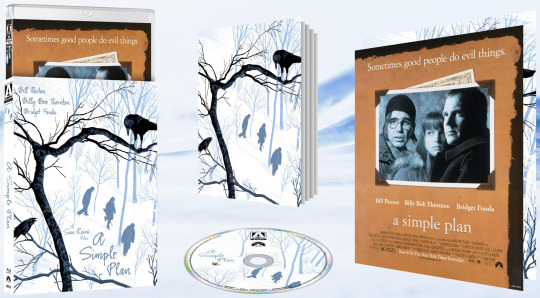
Special features:
Audio commentary by critics Glenn Kenny and Farran Smith Nehme (new)
Audio commentary by production designer Patrizia von Brandenstein with filmmaker Justin Beahm (new)
Interview with cinematographer Alar Kivilo (new)
Interview with actor Becky Ann Baker (new)
Interview with actor Chelcie Ross (new)
On-set interviews with Sam Raimi, Bill Paxton, Billy Bob Thornton, Jane Fonda, and producer Jim Jacks
Behind-the-scenes footage
Theatrical trailer
Booklet with new writing on the film by Bilge Ebiri and an excerpt from John Kenneth Muir's book The Unseen Force: The Films of Sam Raimi
Hank Mitchell (Bill Paxton) and his wife Sarah (Bridget Fonda) have big dreams and a baby on the way, but are stuck in the small Minnesota town where Hank grew up alongside his sweet but naive brother Jacob (Billy Bob Thornton). One day while walking in the woods, Hank, Jacob, and Jacob’s friend Lou (Brent Briscoe) discover a small plane buried in the snow, with a dead pilot inside… and a duffel bag containing over $4 million in cash. It’s a once-in-a-lifetime chance to grasp the American dream in one fell swoop, if they can just keep it a secret – but Hank soon learns that keeping that secret will come at a terrible cost.
Pre-order A Simple Plan.
#a simple plan#sam raimi#Bill Paxton#Billy Bob Thornton#Bridget Fonda#arrow video#dvd#gift#scott smith#matt griffin#neo noir#crime thriller#90s movies#1990s movies
19 notes
·
View notes
Text
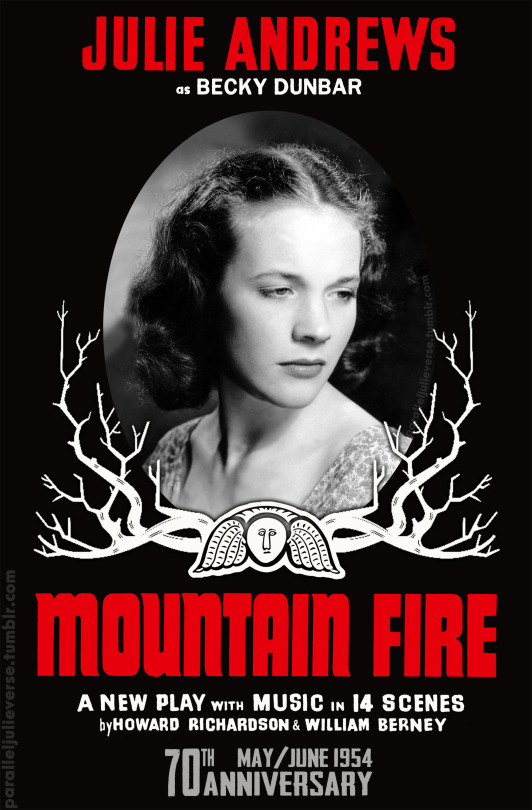
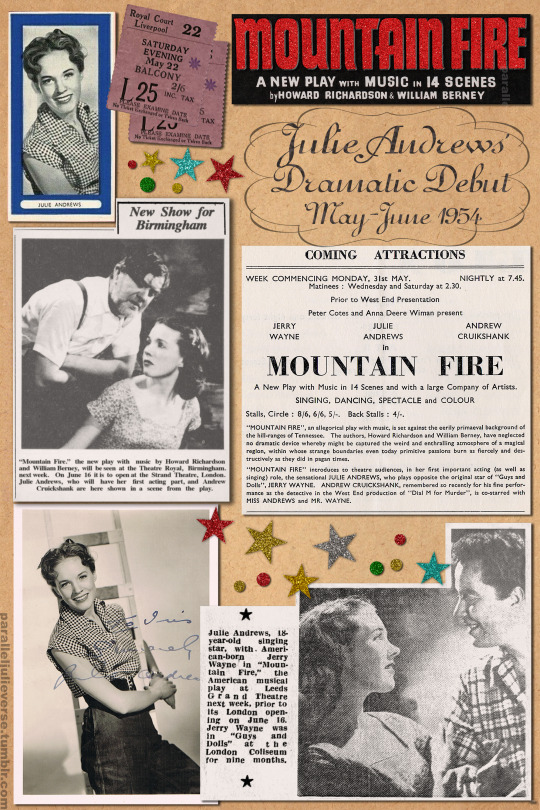
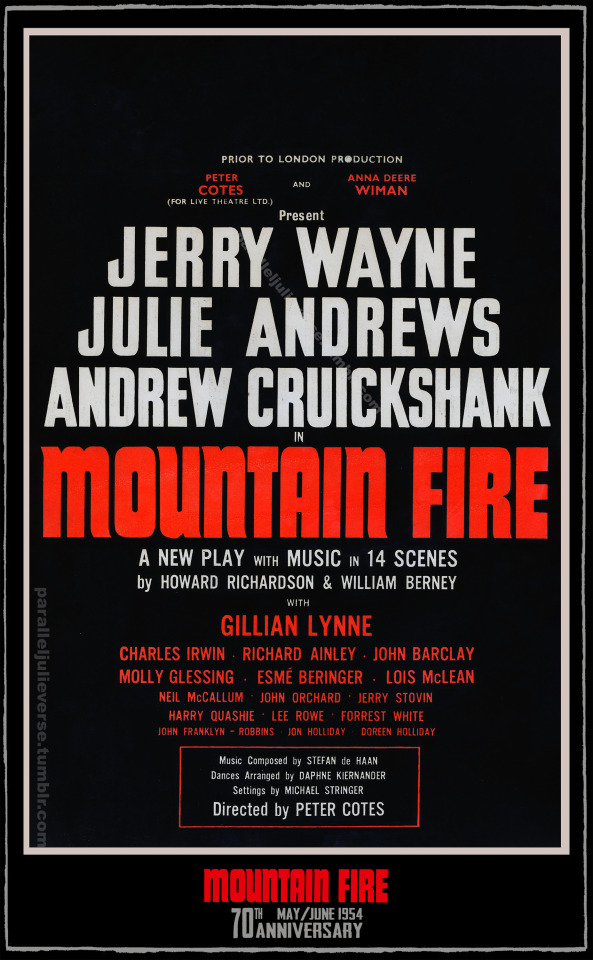
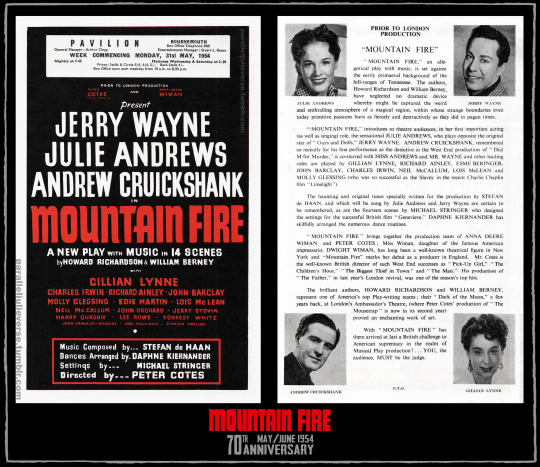
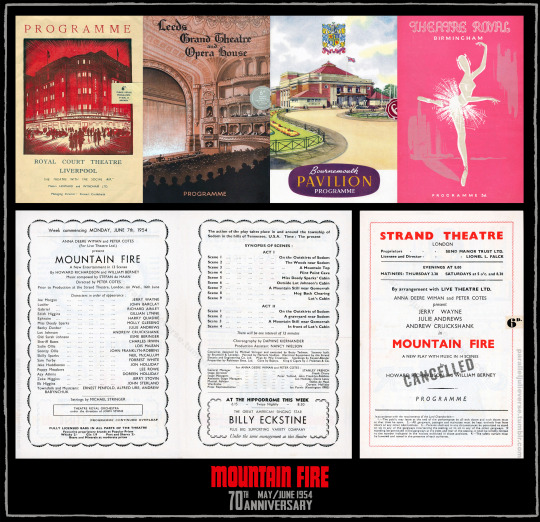
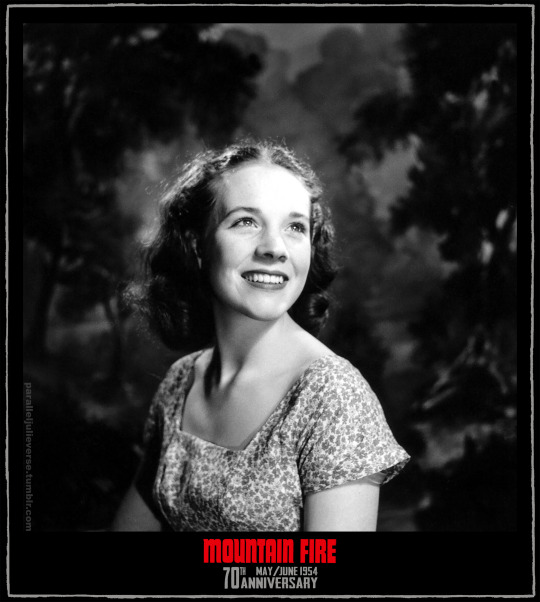
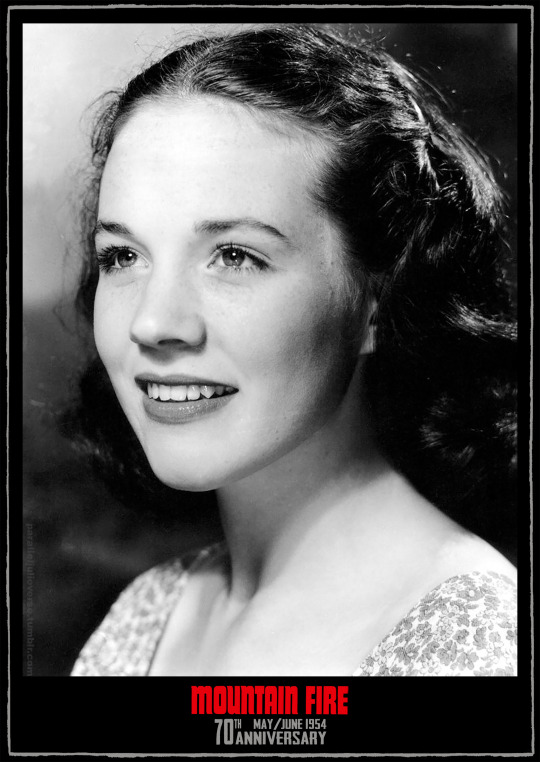
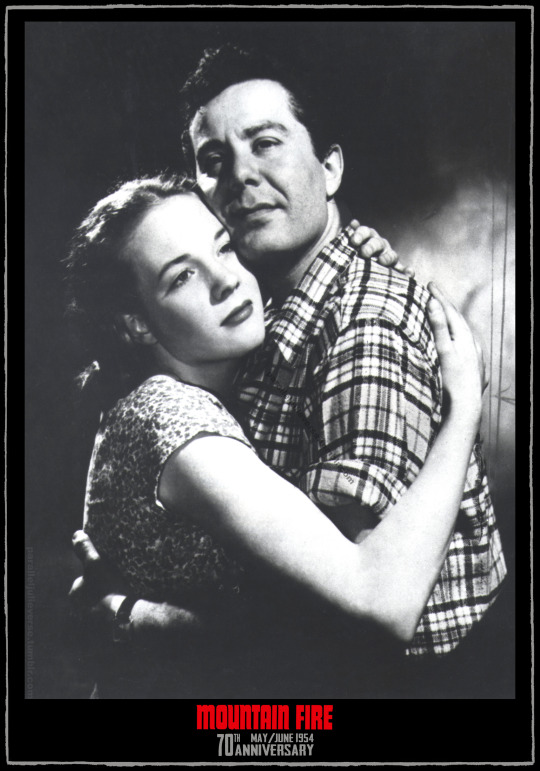
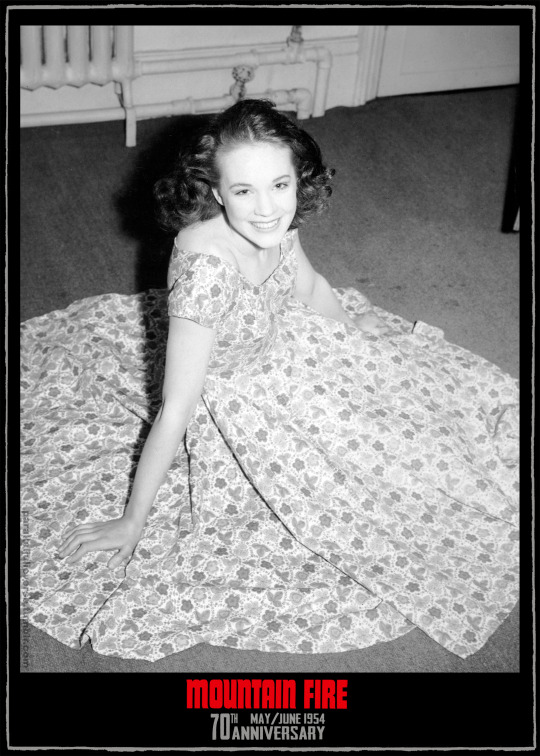
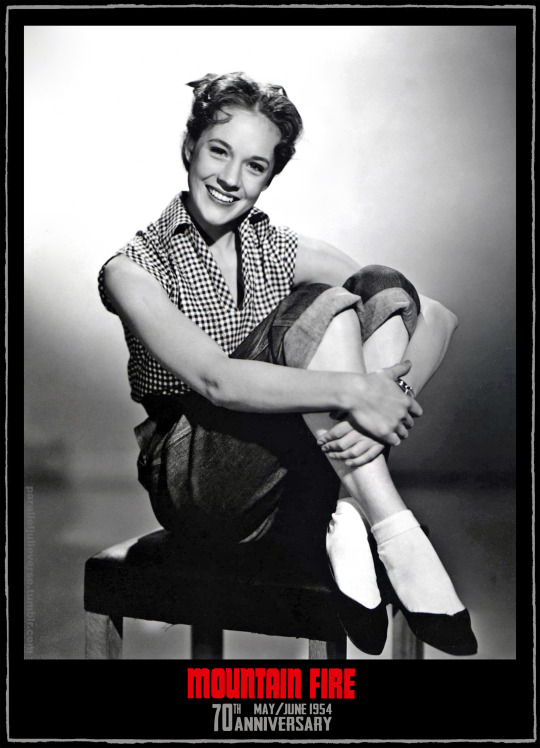
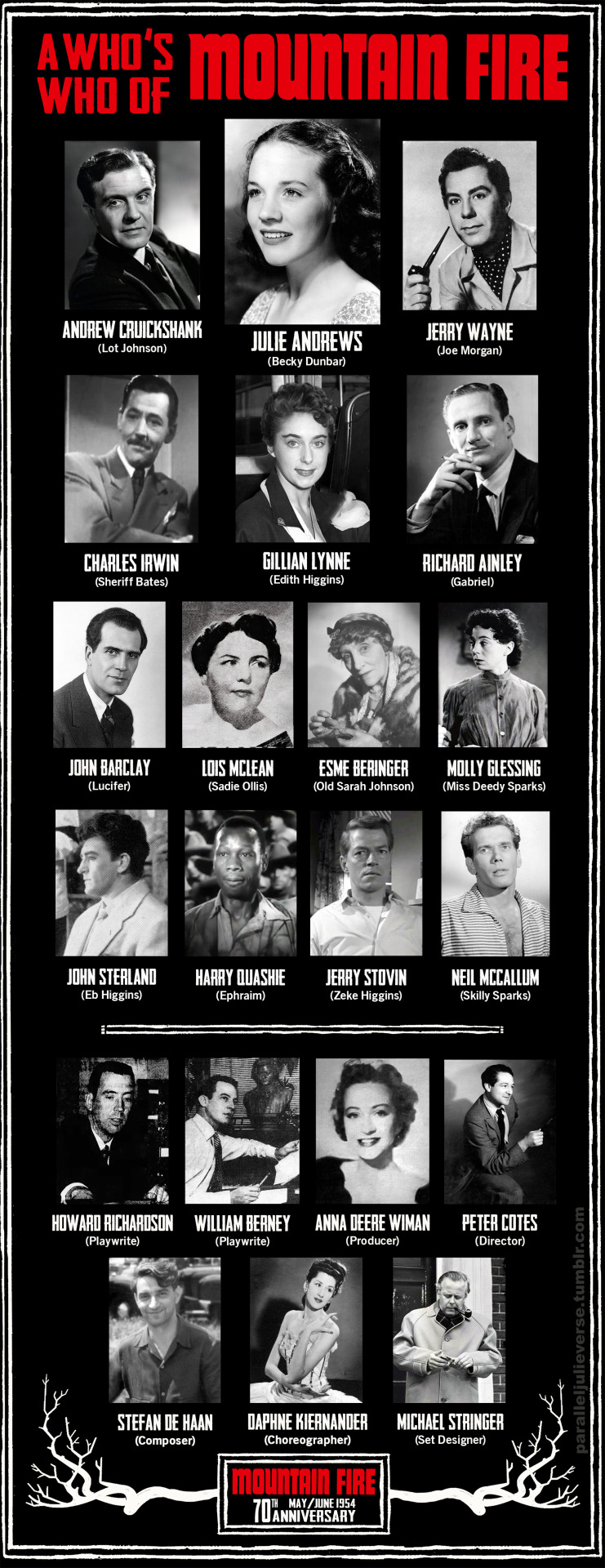
70th anniversary of Mountain Fire Liverpool / Leeds / Bournemouth / Birmingham 30 performances (18 May 1954 - 12 June 1954)
This month marks the 70th anniversary of a significant, if curious, milestone in the early career of Julie Andrews: her 'straight' theatrical debut in Richardson and Berney's Mountain Fire. A notorious flop, Mountain Fire lasted barely 30 performances in a month-long provincial tryout, closing ahead of a planned West End bow. The play would likely have sunk without a trace were it not for the fact that its female lead was on the cusp of international stardom.
While the ill-fated Mountain Fire was on the road, it was formally announced that Julie Andrews had been signed to helm the Broadway cast of The Boy Friend (Chit Chat 1954, p. 8; Mackenzie 1954, p. 4). The stark contrast between the disastrous failure of Mountain Fire and the star-making success of The Boy Friend has become part of the mythology of Julie Andrews' career. Even the Dame herself is fond of playing up the angle. "I had done one bomb in England," she recounts in a 1966 interview, "an incredible disaster...between Cinderella and The Boy Friend. I accepted a very limited engagement, thank God, and played a Southern belle from Tennessee...I can't tell you what went on. It was a disaster" (Newquist 1966, p. 141).
Four decades later in her 2008 memoirs, Julie was still cringing over the experience:
"The truth was, the play was not good, and although the company tried to make it work, we all sensed it was going to be a flop. I also knew beyond a shadow of a doubt that had the eminent London critic Kenneth Tynan seen my performance, it would have been the end of any career I hoped to have. Mercifully, Mountain Fire folded out of town" (Andrews 2008, 160).
Legitimate, at last!
Self-deprecatory humour aside, Julie actually received very good notices for her efforts in Mountain Fire. The Stage declared: "Julie Andrews scores a particularly fine dramatic success in her first serious portrayal, as the ill-starred Becky, bringing rare maturity to the difficult and exacting role" ('American folk play' 1954, p. 10). The Liverpool Echo similarly enthused: "Julie Andrews scores a personal triumph as the young girl and, in her first 'straight' role, reveals herself as accomplished an actress as she is a singer" (H.R.W. 1954, p. 5). While the Yorkshire Evening Post opined: "Julie Andrews gives a beautiful and moving performance as the luckless Becky" (Bradbury 1954, p. 8). Though the production might not have panned out as anticipated, Mountain Fire was a strategic step in Julie's ongoing pivot from child stardom to adult performer. Much was made in show publicity about Julie’s "graduation" from juvenile entertainment to mature dramatic fare:
"Brilliant stage and film children are always a little heartbreaking. So few of them amount to anything after they have reached the colt stage...One of the most happy exceptions is Julie Andrews--the once plain little girl with buck teeth, a slight squint and pigtails who astonished us all by singing operatic numbers in a sweet, clear coloratura when she had reached the ripe age of 12...Now, Julie is to make her debut as a straight actress in a new American play to be presented here by Peter Cotes...called Mountain Fire...Cotes says: 'Julie has a wonderful role and I believe her to be a young actress with great possibilities.'...[A]s she has both singing and dancing to do in her first straight play, this might well be the chance of a lifetime for grown-up Miss Andrews" (Frank 1954, 6).
'A hill-billy Bible story'
Mountain Fire couldn't have represented a more "grown-up" change for Julie. Billed as a "new play with music in 14 scenes", it was the latest offering from rising American playwrights -- and cousins -- Howard Richardson and William Berney. The pair had scored an early success with Dark of the Moon (1945), a fantasy verse play about witchcraft, love, and social intolerance in colonial-era Appalachia. They followed with a second collaboration, Design for a Stained Glass Window (1949) about religious persecution and martyrdom (Duncan 1966, p. S-7; Fisher 2021, p. 248-49).
Mountain Fire trod similarly heavy dramatic ground with a mix of religion, Southern Gothic stylings, and social commentary. Described by one critic as "a hill-billy Bible story", the play was an allegorical retelling of the Abrahamic legend of Sodom and Gomorrah with the "cities of the plains" transposed to "rival colonies of mountain dwellers" in the backwoods of eastern Tennessee (Mackenzie 1954, p. 4).
The scriptural elements of human wickedness and divine retribution were adapted into a laundry-list of stock Southern vices: a Hatfield-McCoy style feud, moonshine, teen pregnancy, arson, murder and, even, a Ku-Klux-Klan lynching ('New American Musical' 1954, p. 12). Punctuating this cavalcade of backwoods iniquity was a series of Greek choric tableaux where Lucifer and the Archangel Gabriel, dressed in mountainfolk mufti, debate the spiritual problems of the characters on stage.
At the heart of this heady mix, Julie was cast in the "Lot's wife" role of Becky Dunbar, a winsome but headstrong teenage mountain girl described in the script as "grow'd up wild as onion weed" (Richardson and Berney, 1954, Act 1, Scene 2, n.p.). Becky finds herself pregnant after a brief dalliance with Joe Morgan, a charming but unscrupulous travelling salesman. She is torn between her passion for Joe and her moral duty to Lot Johnson, a virtuous widower who marries her because "it's the Christian thing to do" (Richardson and Berney, 1954, Act 1, Scene 5, n.p.).
Julie often jokes that "You've never heard a worse Southern accent than mine" (Newquist 1966, p. 141) -- and the script's hillbilly argot certainly would have proved a challenge to her crisp Home Counties consonants and rounded vowels. Becky's very first line, for example, is: "I ain't been gallivantin', just skimmin' rocks at Turkey Creek" (Richardson and Berney, 1954, Act 1, Scene 2, n.p.). Not exactly typical RP phraseology!
On a less challenging note, the show also featured a series of musical interludes with ritual dances and allegorical songs. Sporting titles like "Lullaby to an Unborn Child", "The World is Wide" and "Oh, It's Dark in the Grave", the musical numbers may not have been cheery toe-tapping ditties, but reviewers typically singled out Julie's singing as an all-too-rare highlight.
"Julie Andrews..prov[es] her undisputed musicianship by taking one song on high E flat, solus, and in perfect tune," marvelled one reviewer (Bradbury, 1954, p. 8). Another chimed: "We are inclined to think poorly of Becky until we realise how well she is to be played by Julie Andrews...Sodom and Gomorrah...seem to sweeten because of her presence... and she sings very pleasantly on the few occasions afforded to her" ('Midland entertainments,' 1954, p. 17). Given the Biblical source material, the story of Mountain Fire could only end in grand tragedy. And, lo, by play's end the backcountry villages have been consumed by fire and our poor Julie is turned to salt. If naught else, the last scene of Mountain Fire certainly gave Julie a scenery-chewing finale for her straight dramatic debut:
LOT (Offstage): Remember the warning, Becky! Don't look back! The hoot of the owl is heard. BECKY starts up the hill. She stops, hesitates, almost looks back. Music builds. Again she goes forward, stops, almost looks back. Music continues to build. The third time she turns and does look back. Music crescendo. The lights dim, then rise again. BECKY has become salt. She lies motionless reaching towards JOE. Blackout CURTAIN (Richardson and Berney, 1954, Act 1, Scene 2, n.p.)
From Sodom, Tennessee to the Scepter'd Isle
The background saga of bringing Mountain Fire to the stage was almost as feverish as the storyline. The play began life in 1950 when Richardson and Berney completed their first working script under the original title of Sodom, Tennessee.
The play was initially optioned by Jack Segasture, a 23-year-old would-be Broadway producer who had managed Richardson and Berney's previous work, Design for a Stained Glass Window. That production proved a misfire, closing after just 8 performances, but Segasture was keen to back the playwrights for a second attempt at Broadway success (Watt, 1950, p. 47).
In the summer of 1950, Segasture mounted a series of workshops of Sodom, Tennessee at various regional Pennyslvania theatres (Talley 1950, p. VI-13). Reviewing one of these early work-in-progress performances, the critic for Variety ventured that "with some doctoring, [it] may have possibilities for Broadway, where it is headed" ('Review: Sodom Tennessee', 1950, p. 40). In late-1950, Segasture announced that Sodom, Tennessee was set to start rehearsals the following January ahead of an anticipated New York opening in the spring ('Set Broadway", 1950, p. 26). Robert Perry was contracted to direct, with Robert Lowery and Jean Parker in discussions for the leads ('Film player,' 1951, p. 57). However, in April 1951, Segasture was suddenly drafted into the Army, and plans for the production were promptly scuttled ('Producer drafted,' 1951, p. 15C).
Over the next few years, various attempts were made to resurrect Sodom, Tennessee, but with little progress. In mid-1953, a lifeline came in the form of a pair of second generation producers: David Aldrich, son of famed producer, Richard Aldrich -- a.k.a. Mr Gertrude Lawrence to fans of STAR! -- and Anna Deere Wiman, daughter of Dwight Deere Wiman and heiress to the John Deere family fortune (Shanley, 1953, p. 10). Wiman had come into a sizeable inheritance on her father's death and she effectively bankrolled much of the production's initial $80,000 investment (Franklin, 1953, p. 9-E). Wiman and Aldrich tapped Peter Cotes -- a British director who had scored a recent New York success with A Pin to See the Peepshow -- to take on directorial duties (Calta, 1953, p. 14). They also invited Pulitzer-prize winning composer, Lamar Stringfield, to write the musical score ('Stringfield asked,' 1953, p. 7). At one stage, the producers were allegedly in discussions with none other than Marilyn Monroe to make her Broadway debut in the role of Becky but, wisely perhaps, she declined (Winchell 1953, p. 19).
In early 1954, plans for Sodom, Tennessee underwent a dramatic change. For reasons unknown, Aldrich was suddenly out of the production team. In his place, director Peter Cotes was promoted to co-producer status with Wiman. Possibly because Cotes was British, it was decided to relocate the production across the Atlantic and launch the show in the UK ('News of the theater' 1954, p. 6). Another factor was that production costs were lower in the UK than New York, something which would see the American Wiman remain as a London-based producer for several years (Hatwell 1957, p. 19; Wilson 1956, p. 10). Additionally, Richardson and Berney's earlier work, Dark of the Moon had enjoyed a fairly successful West End run in 1949, so the producers possibly reasoned that the new show might fare similarly well with English theatregoers (Darlington, 1949, p. 5).
Either way, Sodom, Tennessee was now set to make its world premiere in England -- though still with hopes of an eventual New York transfer ('Romantic comedy,' 1954, p. 17C).
'Not fit for the marquee of a British theatre'
Once the production team hit London, they set about preparing the play for its British bow. The first thing to go was the title.
Up until 1968, British censorship laws required all plays intended for public performance to be submitted to the Lord Chamberlain's Office for review and approval (Shellard et al, 2004). It seems the Lord Chamberlain did not approve of a play called Sodom, Tennessee, "an immoral name not fit for the marquee of a British theatre". Initially, the production team toyed with Brimstone as an alternative title, but finally settled on Mountain Fire (Talley, 1954, p. VI-5).
It was also decided that the show needed a musical overhaul. Some incidental music had been composed for earlier iterations, including piecemeal efforts by Lamar Stringfield. One or two of these pieces were retained but, for the most part, the producers opted for a new score. For this task, they contracted Stefan de Haan, a young German musician and composer who had come to study in the UK after the war and stayed on to work with various regional orchestras. De Haan not only composed a new score for Mountain Fire, including three new songs for Julie, but also signed on as music director and conductor (Bradbury 1954, p. 4).
Other key creative appointments were Michael Stringer as set designer and Daphne Kiernander as choreographer. Stringer came to the project fresh from working on the hit Rank comedy, Genevieve (1953), and a host of other film and theatre productions. He designed darkly stylised sets for all 14 scenes of the play, as well as orchestrating special effects for the final destruction sequence (Bishop 1954, p. 8). Kiernander was a classically trained ballerina who had performed as a principal in many West End shows and revues before shifting to choreography. For Mountain Fire, she created two set dances, broadly patterned on 18th century folk dances, and oversaw general staging for the songs ('Chit Chat', 1954, p. 8).
In early April 1954, Howard Richardson and William Berney arrived in London to help make revisions to the script. They also served as dialect coaches for the cast (Talley 1954, p. VI-5). During this early rehearsal period, Julie worked closely with Cotes' actress wife, Joan Miller who, as Julie relates, "tried to help me find the nuances that were needed for the part" (Andrews 2008, p. 171). Indeed, to hear Cotes tell the story, "Julie Andrews...was taught how to act by Joan Miller" and it was "Mountain Fire and Joan Miller between them [that] gave Julie the much needed groundwork..to erupt onto the Broadway stage" (Cotes 1993, p. 23). Not sure Moss Hart would agree, but anyway... Later that month, Cotes and Miller hosted an official launch party for Mountain Fire at their South Kensington home with local theatre and high society luminaries in attendance (Candida, 1954, p. 2). The show's schedule was set with a month-long tryout starting on 17 May in Liverpool, followed by one week runs in Leeds, Bournemouth, and Birmingham. The show's London opening was scheduled for Wednesday, 16 June at the Strand Theatre, Aldwych.
In mid-April, the tour was formally announced with ticket sales opening immediately:
"On May 17 at the Royal Court, Liverpool, Peter Cotes and Anna Deere Wiman will present the world premiere of Mountain Fire by Howard Richardson and William Berney. Making her debut as a straight actress in this play will be 18-year-old Julie Andrews. Other leading roles will be played by Jerry Wayne, Andrew Cruickshank, Gillian Lynne and Charles Irwin. Music for this production has been composed by Stefan de Haan. Decor will be by Michael Stringer, and choreography Daphne Kiernander. Peter Cotes is directing, and following a short tour the play will be presented in the West End" ('Chit Chat: Mountain Fire' 1954, p. 8).
'Every night it was a new show...'
The function of an out-of-town tryout is to put the finishing touches on a show ahead of its official "big city" opening. Cast and crew get to see how the play is working with live audiences and revise things accordingly. In happy cases, the tryout is a relatively easy process of fine-tuning elements and smoothing out wrinkles. In other cases though, the process can be far more tumultuous. Seth Rudetsky (2023) relates that New York theatre-folk popularly joke, "if Hitler were alive today, his punishment should be doing an out-of-town tryout with a show that's in trouble" (p. 152). Even Adolph might have blanched at the Mountain Fire tryout. A sign of early trouble came days out from opening when the producers suddenly announced a 24-hour postponement of the Liverpool premiere from Tuesday 17 to Wednesday 18 May (H.W.R. 1954, p. 4). Rehearsals had revealed serious structural issues with the show and the production team needed every hour they could muster to hammer it into shape.
Worse still, the key creatives couldn't agree about the source of the problems and how to fix them. Director Cotes believed the biggest problem was the script and he wanted major rewrites. For their part, Richardson and Berney felt the musical sequences were at fault.
Jerry Wayne, who took the male lead of Joe Morgan, recalled:
"[W]e ran into trouble with the American authors. They objected to the musical numbers that had been written into their story. We opened at Liverpool on a Thursday night as a musical. Then we were told to cut out the musical numbers. On Friday night we opened at 7.30 as a straight play. With the music cut, the curtain ran down at 8.15" (Greig 1955, p. 9)
The songs were duly reinstated, but competing revisions were trialled to staging and orchestration. In her memoirs, Julie relates:
"Our director couldn't decide whether he wanted the orchestra in the pit or onstage, or no orchestra at all. This was a play, after all, so he then thought maybe one instrument, a guitar, would be enough. We tried the show a different way every night" (Andrews 2008, p. 160).
Another member of the cast, Neil McCallum, similarly recalled the snowballing desperation of the tryout tour:
"Everyone hoped it would get better, so the authors and the director got together and decided to revamp the whole show. They kept writing new scenes every day...every night it was a new show until not even the cast recognized it...Pretty soon the authors and the director weren't speaking. Two days later the authors and the backer weren't speaking. Finally, no one was speaking" (Tesky 1954, p. 6).
A comparison of scene synopses printed in programmes for Mountain Fire across its month-long tryout reveals the extent to which the production altered across performances. During its first night in Liverpool, the show was comprised of three acts and fourteen scenes. The following week in Leeds, it was still three acts but down to only ten scenes. In Bournemouth, it was back to three acts with fourteen scenes. By the time it got to Birmingham, the play was suddenly just two acts with thirteen scenes!
'Call down fire and brimstone...'
Given the panicked disorganisation that plagued the tryout, it should not surprise that reviewers took a rather dim view of Mountain Fire. Indeed, other than praise for Julie and fellow cast members, critics were mostly scathing in their assessment of the show -- with notices getting progressively more brutal as the tour continued:
The Liverpool Echo: "When the new play, Mountain Fire, opened with a dissertation by the Angel Gabriel and Lucifer on the delights of being good and bad, it was obvious that this world premiere at the Court Theatre last night would provide something unusual -- and so it proved. But whether this modern parable of Lot's wife will meet with general approval is problematical, because in attempting to lighten high drama with a smattering of musical numbers plus one or two dances, the American authors, Howard Richardson and William Berney, have achieved a curious hotch-potch which is neither one thing nor the other" (H.W.R. 1954, p. 5).
The Stage: "The Liverpool audience could be forgiven for their puzzlement over this provocative, somewhat bewildering, production, which rather inclines to fall between the two stools of allegorical drama and musical entertainment, lacking the virtue of anything in the way of a hit tune" ('American folk play' 1954, p. 10).
The Yorkshire Observer: "Symbolism on the stage is meat only for those who can stomach such food and, it is difficult to live on meat alone. So it might be that Mountain Fire which, in the second week of its production, is now at the Leeds Grand Theatre, might easily die as quickly as the symbolical fire it portrays, no matter how brilliant the cast" ('Symbolistic musical' 1954, p. 6).
Birmingham Daily Gazette: "Mountain Fire, a somewhat disastrous item which arrived at the Theatre Royal, Birmingham, last night, is an odd mix of sex and religiosity which, I fear, will prove seriously offensive to many...The whole thing is meant to be an allegory, with a deep application to our atom-bomb age. But it is all expressed in such appallingly banal language that it leaves one convinced that the underlying thought must be equally banal...One can only have sympathy for the very talented performers who struggle with this material" (Mackenzie 1954, p. 4).
Evening Despatch: "Howard Richardson and William Berney are evidently generous-minded men. In their play, Mountain Fire, at Birmingham Theatre Royal, they include murder, two burials, the Ku Klux Klan..., Lucifer, the Archangel Gabriel, religion and, of course, sex...Directed by Peter Cotes, this is a bewildering story of sin among the backwoodsmen of Tennessee...Somewhere in all this there may be a moral. At first I found it difficult to keep up. Eventually I gave up trying" (Holbrook 1954, p. 6).
The Birmingham Mail: "The conscientious critic of the drama will find that there are certain troublesome questions which are created in the mind by Mountain Fire, the new play by Howard Richardson and William Berney. How, for instance, did it come about that it reached the stage of the Theatre Royal at all and how is it that next week it is to occupy the stage of a West End theatre, however short its tenure there may be? What is more to the immediate point is how one ought...to deal by way of notice with so poor an offering. Ought one to call down fire and brimstone or, refusing to treat the piece seriously, as did many of the audience last night, rend it with ridicule?" (C.L.W 1954, p. 4).
'Mountain Collapses'
With this level of bad press, the prognosis for Mountain Fire was bleak. Ticket sales were sluggish and the cast often found themselves playing to half empty houses. Even worse, audience members were increasingly audible with their displeasure. As Neil McCallum relates:
"One of the lines at the last of the play is 'Lot, don't turn back.' Came a voice from the audience, 'I don't know about turning back -- I want my bloody money back.' In the interval, the ushers were mingling with the audience saying, in ringing tones, 'isn't it terrible...don't you wish you hadn't come?'" (Tesky 1954, p. 6).
By the final week in Birmingham, the writing was on the wall and producers decided to avoid what would surely have been a critical and commercial bloodbath in London. On Thursday 10 June, barely 5 days before the show was scheduled to open at the Strand, Wiman and Cotes issued a joint statement saying they were cancelling the West End premiere of Mountain Fire:
"In view of the inadequate public response during the tour of the play, it would be unfair to the authors and the actors and other members of the production that it should open in London, at least without substantial variations" ('Play is off', 1954, p. 3).
The decision to cancel a major production so close to its premiere was not without precedent, but it was sufficiently rare to garner widespread press attention, generating a slew of punning headlines. "London douses 'Mountain Fire'," trumpeted the New York Times (1854, p. 13). "Mountain Collapses" blared the Kensington News ('Theatre Notes' 1954, p. 2). And "Mountain Fire Out!" declared the Daily Post (Daily Post London Reporter 1954, p. 1)
Mountain Fire had two further performances to complete its Birmingham run, and once the curtain came down on Saturday night of 12 June, the production staggered to its sorry close. Richardson and Berney had already taken early departure back to the US, unable to watch the show's final demise. Cotes similarly retreated to London and refused for many years to even discuss the play. Producer Anna Wiman insisted on staying to the very end. "No cast has been more loyal than this one," she declared, valiantly talking up a future for the show. "[I]t's not the end...I believe in this play and I am determined that it shall have a successful run in London. It will have a new director and a new atmosphere" (Mercury Staff Reporter 1954, p. 1.) The following March, a 'news in brief' snippet claimed Wiman was "still trying to lease or buy a theatre, with the Bill Berney-Howard Richardson play, Mountain Fire, as first on her production schedule" (Walker 1955, p. 61). But a year later, she would admit defeat, having lost the full extent of her £40,000 investment in the show (Wilson 1956, p. 10).
In the end, it wasn't just the UK production of Mountain Fire that sank. The play itself effectively vanished with little appreciable after-life. The script was never published, nor is there any record of it being registered with a theatrical licensing company. Only one further staging of the show ever seems to have taken place: a brief five performance run in May 1962, under the play's original title of Sodom, Tennessee, at the Little Theatre of the West Side YMCA in Manhattan ('Premiere,' 1962, p. 14). Billed as the show's "New York premiere", it didn't attract much attention and there are no published reviews. After that, the play's trail comes to a complete halt.
If it weren't for the show's status as a footnote to the career of Julie Andrews, Mountain Fire would likely have been completely lost to history. Even at the time of its cancellation, reports were already framing Mountain Fire as a blip on the way to Broadway success for Julie:
"Julie may have missed a West End appearance, but she is to be compensated by a Broadway lead in The Boy Friend when the show goes to New York in the autumn" ('Theatre Notes' 1954, p. 2).
Within a year or two, Julie's stardom was the principal frame of reference for any mention of Mountain Fire. It even became something of a boast for those behind the ill-fated production .
In 1956, when Julie was riding high on the success of My Fair Lady, an Alabama newspaper crowed that local playwright William Berney "discovered Julie Andrews [when] he was in London...casting his play Mountain Fire...Julie 'was it' so far as Berney was concerned, and a happy unknown made her bow" (Caldwell 1956, p. E-1). Not to be outdone, Howard Richardson was also soon talking up how his "plays have sent many actors and actresses on their way to fame including...Julie Andrews...who played one of her first roles in Richardson's Mountain Fire during its London [sic] run" ('New York playwright' 1959, p. 14).
All of which only proves the popular adage that, where failure is an orphan, success has many fathers!
____________________________
Who's Who of Mountain Fire
While Julie was undoubtedly the biggest star associated with Mountain Fire, the show included a roster of established and upcoming theatre talents, many of whom went on to bigger and better things:
Principals
Jerry Wayne as Joe Morgan (1919-1996): Born in Buffalo, New York in 1919, Wayne was a recording vocalist of some note who even hosted his own CBS radio show in the 1940s. He came to London in 1953 to play the lead role of Sky Masterson in the West End production of Guys and Dolls, marking the start of a British career. He appeared in the 1955 film musical, As Long as They're Happy and made several TV appearances in the 1960s. In 1967, Wayne married the novelist Doreen Juggler and graduated to a second career as a theatre and recording producer. Collaborating with his son Jeff, Wayne had notable success with the 1978 concept album, Jeff Wayne's Musical Version of The War of the Worlds. Wayne passed away in Hertfordshire in 1996 ( 'Jeff Wayne' 1996, p. 24).
Andrew Cruickshank as Lot Johnson (1908-1988): Born in Aberdeenshire, Cruickshank initially pursued civil engineering before turning to the stage. He made his professional debut in Shakespeare repertory and joined the Old Vic in 1937, playing notable roles such as Banquo in Macbeth, opposite Olivier. During WWII, he served in the Royal Welsh Fusiliers, earning an MBE. His varied career included significant roles in the West End production of Inherit the Wind (1960) and the National Theatre's Strife (1963). His best know role came courtesy of television as Dr. Cameron in the popular BBC series, Dr. Finlay's Casebook (1962-71). In later life, Cruickshank wrote a number of plays, and was president of the Edinburgh Fringe Society. He died in 1988 ('Andrew Cruickshank' 1988, p. 310).
Charles Irwin as Sheriff Bates (1908-1984): Born in 1908 in Leeds, Irwin began his career in variety shows and became a comedian and vocalist on radio in the 1930s. He worked extensively in regional theatre and appeared as a character actor in films such as The Third Man (1949), A Tale of Five Women (1951), and Mystery Junction (1951). In later decades, he transitioned to television, appearing in popular series like Danger Man (1960), International Detective (1961), and The Saint (1962). Irwin passed away in November 1984 in Salisbury.
Gillian Lynne as Edith Higgins (1926-2018): An influential figure in British theatre and dance, Lynne was born in 1926 in Bromley, Kent. She began her career as a ballerina, dancing with Sadler's Wells, the English National Opera, and the Royal Shakespeare Company. Lynne subsequently moved into choreography, working on many successful West End musicals. She was best known for her collaborations with Andrew Lloyd Webber, where her choreography was instrumental to the success of shows such as Cats and The Phantom of the Opera. In recognition of her contributions to dance and musical theatre, Lynne was made a Dame Commander in 2014. She passed away in 2018 at the age of 92 (Dex 2018, p. A13).
Richard Ainley as Gabriel (1910-1967): Ainley was born in Middlesex in 1910, the son of famed Shakespearean actor Henry Ainley. He debuted on stage with Martin Harvey's company, before going on to work with the Old Vic and Sadler's Wells. His first film role was in As You Like It (1936), followed by notable roles in The Tempest (1939) and Above Suspicion (1941). Severely wounded in WWII, Ainley had to abandon his film career and could only continue with occasional stage roles. Later, he focused on broadcasting and adjudication, briefly leading the Bristol Old Vic Theatre School in the early 1960s. He passed away in 1967 at age 56 (Coe 1967, p. 23).
John Barclay as Lucifer (1892-1978): Barclay was born in 1892 in Bletchingly, Surrey. A tall man with a booming basso baritone, he trained as an opera singer and toured widely with various companies, including D'Oyly Carte. He appeared in several films, including The Mikado (1939) and Dr. Jekyll and Mr. Hyde (1941). In the late 1950s, Barclay moved to the US, where he pursued a late career playing strong and menacing character parts in film and TV. He passed away in 1978 at the age of 86.
Supporting Players
Molly Glessing as Miss Deedy Sparks (1910-1995): Midlands-born Glessing began her career in variety in the 1930s as a singer, dancer, and comedienne. She rose through the ranks to become a featured player in comedies and pantomimes. During the war, she gained popularity as a radio player and ENSA entertainer. After marrying a US serviceman, she relocated to California. Dividing her time between the US and the UK, Glessing continued to work in stage productions and amassed numerous character credits in films such as Charlie Chaplin's Limelight (1952), and TV shows, including The Quatermass Xperiment (1955) and Alfred Hitchcock Presents (1955-1962) ('Glessing" 1996, p. 33).
Lois McLean as Sadie Ollis (1927-2013): Canadian-born McLean studied drama at the University of Alberta and performed for several years with the Everyman Theatre Company in Vancouver. In 1950, she moved to the UK where she continued to perform, while studying theatre production with the Glasgow Citizen's theatre. In 1953, McLean started work as a manager for Peter Cotes and he cast her in various productions including Mountain Fire (Narraway 1954, p. 34). The pair also collaborated on a book, A Handbook of British Amateur Theatre. In the late-50s, she wed Indian-born lawyer, Birendra Jha and returned to Canada to start a family. McLean continued to perform and teach drama in Edmonton.
Esme Beringer as Old Sarah Johnson (1875-1972): Born in London to artist parents, Esme Beringer was a celebrated stage actress who made her professional debut in 1888. Known for her athletic physique and swordsmanship, she excelled in breeches roles, including playing Romeo, Little Lord Fauntleroy and The Prince and the Pauper. An enthusiastic fencer, she taught classes during WWI and starred in Shakespearean roles post-war. In later life, Beringer moved into character parts both on stage and in film. She died in 1972 at the grand age of 96 ('Esme Beringer' 1972, p. 16).
Neil McCallum as Skilly Sparks: (1929-1976) Born in Canada in 1929, McCallum moved to the UK to study at the Guildhall School of Music and Drama. Following graduation he appeared in a number of stage shows, scoring his greatest theatrical success in 1956 with the West End production of The Rainmaker opposite Sam Wanamaker. In the 1960s, McCallum became a familiar face on British television in series like The Saint (1963-64) and Department S (1969), as well as voicing characters on Thunderbirds Are Go (1966). Transitioning behind the scenes, McCallum became a scriptwriter and producer of some note, helming a number of TV series for the BBC before his untimely death from a cerebral hemorrhage in 1976, aged only 46 ('Neil McCallum', 1976, p. 11). As detailed by Julie in the first volume of her memoirs, she and McCallum embarked on a serious, if short-lived, romance during the production of Mountain Fire (Andrews, 2008, p. 161ff).
Jerry Stovin as Zeke Higgins (1922-2005): Born in Unity, Saskatchewan in 1922, Jerry Stovin served in the Canadian Army where he got the acting bug performing in military entertainments. Following the war, he went to Carnegie Tech to study drama, and moved to Britain in 1955. There he carved out a successful career in radio, television, and film, often playing American roles. He passed away in 1978 at the age of 86 (Peacock 1975, p. 7).
Harry Quashie as Ephraim (1914-1982): Born in Ghana, Quashie originally came to the UK to study law in 1939. He started to act in university theatricals and soon gave up his studies to pursue an acting career. He performed in a wide range of stage, radio and TV dramas and was a founding member of the Negro Theatre Company which helped pave the way for Black theatre artists in Britain. In the 50s, Quashie had character parts in several big screen features notably, Simba (1955), Safari (1956), and, The Passionate Summer (1958) ('Gave up law' 1947, p. 1; Bourne 2021).
John Sterland as Eb Higgins (1927-2017): Another Canadian actor, Sterland was born in Winnipeg to English parents. He came to the UK on a RADA scholarship, before joining the West of England Theatre Company. In a long career, Sterland racked up scores of stage and screen credits including A Countess from Hong Kong (1967), Performance (1970), Ragtime (1981), Bad Medicine (1985), Batman (1989), and The Tudors (2007). Married for many years to fellow actor, June Bailey, Sterland passed in 2017 ('John Sterland' 2017, p. 12).
Creatives
Howard Richardson (1917-1984): Born in Spartanburg, South Carolina, Richardson graduated from the University of North Carolina in 1938 and earned his M.A. in drama in 1940. After serving in the Army, Richardson co-wrote Dark of the Moon with cousin and frequent collaborator, William Berney. The play opened on Broadway in 1945, running for 318 performances. Despite frequent efforts, both in collaboration with Berney and as an individual playwright, Richardson would never match this initial success. In 1960, he earned a doctorate in 1960 and embarked on a career as a drama professor, working at various colleges throughout the US. He passed away in 1984 ('Howard Richardson', 1985, p. 34).
William Berney (1920-1961): Born in Birmingham, Alabama, Berney graduated from the University of Alabama, where he was active in drama. He later attended graduate school at the University of Iowa, where he started writing plays with Richardson. After graduation, Berney worked in advertising in New York, while pursuing his scriptwriting career on the side. During this period, he co-wrote several plays with Richardson, including Design for a Stained Glass Window (1950) and Protective Custody (1956). Berney moved to California around 1960 to write for television, but sadly passed away in Los Angeles in 1961 after a brief illness, aged 40 ('William Berney' 1961, p. 23) .
Peter Cotes (1912-1998): A theatrical polymath, Cotes -- who was born as Sydney Boulting in Maidenhead, Berkshire -- was part of a noted artistic family. His parents ran a theatre company and his brothers John and Roy Boulting became important filmmakers in British cinema. Initially an actor, Cotes shifted his focus to theatre production and directed the original production of The Mousetrap, the world's longest-running play. Other notable successes as director included the West End productions of The Children's Hour (1951) and A Pin to See the Peepshow (1952), and, in film, The Right Person (1955) and The Young and the Guilty (1958). In later years, Cotes wrote books and helmed a number of theatre companies. He passed away in 1998, at the age of 86 ('Peter Cotes' 1998, p. 35).
Anna Deere Wiman (1920-1963): Born in Illinois, Wiman was the daughter of successful theatre producer Dwight Deere Wiman, and heir to the John Deere family fortune. Educated by private tutors, she trained as a ballerina in Paris until a cycling accident ended her dance career. She then shifted to theatre management, initially working under her father. After his sudden death, she inherited a fortune, allowing her to become a self-funded theatre producer. Moving to London in 1954 with Mountain Fire, Wiman remained in the UK where she produced several West End productions, including The Reluctant Debutante (1955), Dear Delinquent (1957), and The Grass is Greener (1958). Despite her professional successes, Wiman struggled with alcoholism. She tragically died in 1963 at her holiday home in Bermuda from a fall down the stairs while under the influence. She was only 43 years old. ('Obituary: Anna Deere Wiman' 1963, p. 27.)
Stefan de Haan (1921-2010): Born in Darmstadt, Germany, de Haan was a gifted musician who trained in Berlin and Florence, before coming to the UK to study composition at the Royal College of Music. Following graduation, he initially gained prominence as a bassoonist, performing with various ensembles and orchestras. His compositional work includes a range of chamber music and orchestral pieces, often highlighting his expertise with woodwind and brass. His influence extended into music education, where his works are still performed and studied today. De Haan passed away in 2010, aged 89 (Bradbury 1954; 'Stefan de Haan' 2024).
Daphne Kiernander (1921-1998) Born in 1921, in East Preston, West Sussex, Kiernander was an accomplished dancer who rose to fame performing in various West End reviews and musicals such as Bobby Get Your Gun (1938), Let's Face It (1942), and Piccadilly Hayride (1946). She moved into choreography working on a number of stage and TV productions, including Such Is Life (1950) and Puzzle Corner (1953) for the BBC, and the Old Vic's 1955 production of The Taming of the Shrew. In the 1960s, Kiernander retired from dance to marry and start a new career in business and marketing (Powell 1962).
Michael Stringer (1924-2004) One of Britain's most successful film art directors, Stringer developed a passion for cinema early on. After serving as a RAF pilot in WWII, he trained with Norman Arnold at Rank Studios. There he scored notable success with one of his first independent assignments, Genevieve (1953), and followed it up with other popular Rank titles like An Alligator Named Daisy (1955) and Windom's Way (1957). His success in Britain led to international offers, working on big productions such as The Sundowners (1960), In Search of the Castaways (1962), and A Shot in the Dark (1964). Stringer went on to a distinguished Hollywood and UK career, bringing his talents to a long and diverse list of films, including Fiddler on the Roof (1971), which earned him an Oscar nomination, The Greek Tycoon (1978), The Awakening (1980), The Mirror Crack'd (1980), and The Jigsaw Man (1983). Stringer passed away in 2004. (Eyles 2004, p. 43).
Sources:
'American folk play: Mountain Fire bewilders.' The Stage. 20 May, p. 10.
'Andrew Cruickshank.' (1988). The Stage. 26 May, p. 10
Andrews, J. (2008). Home: A memoir of my early years. London: Weidenfeld and Nicolson.
Bishoff, T. (1963). 'Playwright Richardson turns professor.' The Eugene Register-Guard. 6 October, p. 2E.
Bishop, G.W. (1954). 'Theatre Notes: an American play to start in London'. The Daily Telegraph & Morning Post. 3 May, p. 8.
Bourne, S. (2021). Deep are the roots: Trailblazers who changed Black British theatre. History Books.
Bradbury, E. (1954). 'Music Notes: Former YSO player as a theatre composer.' The Yorkshire Post and Leeds Mercury. 22 May, p. 4
Bradbury, E. (1954). 'Mountain Fire at the Grand Theatre.' Yorkshire Evening Post. 28 May, p. 8.
Caldwell, L.M. (1956). 'Julie Andrews: Birmingham man discovered "my fair lady".' The Birmingham News. 28 October, p. E-1.
Calta, L. (1953). ‘Cotes will direct “Sodom, Tennessee”: drama based on Biblical story to open on Broadway early in February -- 26 in cast.’ New York Times. 7 November, p. 14.
Candida. (1954). Theatre Notes: Peter Cotes and party. The Kensington News and West London Times. 23 April, p. 2.
'Chit Chat: Mountain Fire'. (1954). The Stage. 22 April, p. 8.
'Chit Chat'. (1954). The Stage. 20 May, p. 8.
C.L.W. (1954). 'Modern morality play.' The Birmingham Mail. 8 June, p. 4.
Coe, J. (1967). 'Obituary: Mr. Richard Ainley." Evening Post. 23 May, p. 23.
Cotes, P. (1993). Thinking aloud: Fragments of autobiography. Peter Owen Publishers.
Daily Post London Reporter. (1954). 'Mountain Fire out'. Liverpool Daily Post. 11 June, p. 1
Darlington, D.A. (1949). 'First Night: A triumph of production, play about witches.' Daily Telegraph. 10 March, p. 5.
Dex, R. (2018). 'Cats choreographer Gillian Lynne dies at 92.' Evening Standard. 2 July: p. A13.
'Drake in Village'. (1952). Daily News. 10 November, p. 17C.
Duncan, R. (1966). 'They know the old-time religion.' Independent Star-News. 20 February, p. S-7.
'Esme Beringer.' (1972). The Stage. 6 April, p. 16.
Eyles, A. (2004). 'Obituary: Michael Stringer.' The Independent. 2 April, p. 43.
'Film player gets lead with Parker.' 1951. Daily News. 14 February, p. 57.
Fisher, J. (2021). Historical dictionary of contemporary American theater. Rowman & Littlefield Publishers.
Frank, E. (1954). 'Julie Andrews graduates.' News Chronicle. 15 April, p. 6.
Franklin, R. (1953). 'On Broadway.' Miami Daily News. 19 July, p. 9-E.
'Gave up law for stage.' (1947). Evening Telegraph. 13 October, p. 1.
'Glessing, Molly". (1996). The Spotlight. January, p. 33.
Greig, R. (1955). 'Mr. Wayne will not rush this script.' Evening Standard. 22 June, p. 9.
Hatwell, D. (1957). 'Anna becomes a powerful force in British theatre.' Evening Post. 12 December, p. 19.
Holbrook, N. (1954). 'The devil gets good parts.' Evening Despatch. 8 June, p. 6.
'Howard Richardson is dead; co-author of "Dark of Moon".' (1985). The New York Times. 1 January, p. 34.
H.W.R. (1954). 'And on the stage.' The Liverpool Echo. 7 May, p. 4.
H.W.R. (1954). 'Mountain Fire: world premiere in Liverpool' The Liverpool Echo. 19 May, p. 5.
'Jeff Wayne'. (1996). The Stage. 26 September, p. 24.
'John Sterland.' (2017). Wandsworth Times. 30 December, p. 12.
'London Douses "Mountain Fire'". (1954). New York Times. 12 June, p. 13.
Mackenzie, K. (1954). 'Show News: She's on her way to Broadway.' Birmingham Daily Gazette. 4 June, p. 4.
Mackenzie, K. (1954). 'A hill-billy Bible story.' Birmingham Daily Gazette. 8 June, p. 4.
Mercury Staff Reporter. (1954). 'Miss Wiman admits a failure.' The Sunday Mercury. 13 June, p. 1.
'Midland entertainments: Mountain Fire.' (1954). Birmingham Daily Post, 8 June, p. 17.
Narraway, M. (1954). 'Actress is happy again.' The Vancouver Province. 27 March, p. 33.
'Neil McCallum.' (1976). The Stage and Television Today. 29 April, p. 11.
'New American musical at Theatre Royal.' (1954). The Birmingham Post. 4 June, p. 4.
Newquist, R. (1966). 'Julie Andrews: An overnight success -- after 22 years.' McCalls. March, pp. 83, 140-43.
'New York playwright visits town.' (1959). Johnson City Press-Chronicle. 15 July, p. B-4.
'News of the theater.' (1954). Brooklyn Eagle. 16 March, p. 6.
'Obituary: Anna Deere Wiman.' (1963). The Stage. 28 March, p. 27.
Peacock, B. (1975). 'Jerry Stovin is busy.' The Leader-Post. 18 July, p. 7.
'Peter Cotes, 86, producer and director of 'Mousetrap'." (1998). The New York Times. 18 November, p. 35.
'Play is off: inadequate support during tour.' (1954). Daily Mail. 11 June, p. 3.
Powell, E. (1962). 'She turns from show business to shops.' The Liverpool Echo and Evening Express. 30 March, p. 18.
'Premiere of "Sodom" Friday. (1962). New York Times. May 12, p. 14.
'Producer drafted, 2 plays in doubt.' (1951). Daily News. 28 March, p. 15C.
'Review: Sodom Tennessee, Guthsville, Pa. Aug. 29.' (1950). In Beckhard, R. & Effrat, J. (Eds). Blueprint for summer theatre: 1951 supplement. John Richard Press, pp. 40-41
Richardson, H. & Berney, W. (1954). Sodom, Tennessee: A play in three acts. British Library, Lord Chamberlain’s Collection of Plays 1954/37.
'Romantic comedy set for October.' (1954). Daily News. 12 March. p. 17C.
Rudetsky, S. (2023). Musical theatre for dummies. John Wiley & Sons.
'Set Broadway showing of "Sodom, Tennessee".' The Chattanooga Times. 19 November, p. 26.
Shanley, J.P. (1953). 'New team follows in fathers' steps: David Aldrich, Anna Wiman to offer "Sodom, Tennessee" as first play in Fall.' New York Times. 3 July, p. 10.
Shellard, D., Nicholson, S., & Handley, M. (2004). The Lord Chamberlain regrets : a history of British theatre censorship. British Library.
'Stefan de Haan'. (2024). Musicalics: The classical composers database. [Website].
'Stringfield asked to pen music for "Sodom, Tennessee".' (1953). The Knoxville News-Sentinel. 4 June, p. 7.
'Symbolistic musical at Leeds Grand.' (1954). The Yorkshire Observer. 26 May, p. 6.
Talley, R. (1950). 'An imaginary Tennessee won is site for "wicked" new play.' The Commercial Appeal. 8 October, p. VI-13.
Talley, R. (1954). 'British actors must learn how Tennessee hillbilly talks.' The Commercial Appeal. 18 April, p. VI-5.
Testy, H. (1954). 'New twist to success story: Neil McCallum on ladder to acting career.' The Saskatoon Star-Phoenix. 11 August, pp. 3, 6.
'Theatre Notes: Mountain Collapses.' (1954). The Kensington News and West London Times. 18 June, p. 2.
Watt, D. (1950). 'Ailing Harrison can't stage play.' Daily News. 7 February, p. 47.
'William Berney, 40, Coast playwright.' (1961). The New York Times. 25 November, p. 23.
Wilson, C. (1956). 'Now Miss Wiman is on "The Ball"." Daily Mail. 20 April, p. 10.
Winchell, W. (1953). 'The Main Stem Lights: Marilyn rejects role.' The Pittsburg Sun-Telegraph. 8 December, p. 19. ©2024, Brett Farmer. All rights reserved.
12 notes
·
View notes
Note
Hi, do you have recs for books similar to Love, Simon? I'm looking for fiction relating to the journey of coming in terms of one's sexuality?
Thank you
Absolutely - first off, the book it's based on, Simon vs. the Homo Sapiens Agenda by Becky Albertalli. Also check out Date Me, Bryson Keller! by Kevin van Whye, True Letters From a Fictional Life by Kenneth Logan, and Time Out by Sean Hayes, Todd Milliner, and Carlyn Greenwald for m/m (and some personal favorites that aren't nearly as light, More Happy Than Not by Adam Silvera and Last Seen Leaving by Caleb Roehrig.) In f/f, check out Late to the Party by Kelly Quindlen, Cool for the Summer by Dahlia Adler, and Imogen, Obviously by Becky Albertalli.
18 notes
·
View notes
Text
Get To Know Me
Fandom Peeps to Get to Know Better
Thank you for the tag, @anneapocalypse ! 💙
Tagging: uhhhhhhhhhhhhh YOU
three ships i like:
Urianger/Warrior of Light (FFXIV)
Sheridan/Delenn (Babylon 5)
Tav/Astarion/Halsin (BG3)
first ship ever: Leonardo from the Ninja Turtles and a nebulous OC that my five year old brain made up
last song you heard: "Rasputin" by Boney M
favorite childhood book: Silverwing by Kenneth Oppel
currently reading: nothing at this time. i should pick a book. The last book I read was Becky Lynch's memoir.
currently watching: We just finished Superman and Lois which was amazing
currently consuming: dihydrogen monoxide
currently craving: breakfast sammich
6 notes
·
View notes
Text
Commons Vote
On: Passenger Railway Services Bill (Public Ownership) Bill: Second Reading
Ayes: 351 (96.6% Lab, 2.3% Ind, 0.8% Green, 0.3% SDLP) Noes: 84 (100.0% Con) Absent: ~215
Day's business papers: 2024-7-29
Likely Referenced Bill: Passenger Railway Services (Public Ownership) Bill
Description: A Bill to make provision for passenger railway services to be provided by public sector companies instead of by means of franchises.
Originating house: Commons Current house: Commons Bill Stage: Committee of the whole House
Individual Votes:
Ayes
Labour (341 votes)
Abena Oppong-Asare Abtisam Mohamed Adam Jogee Adam Thompson Afzal Khan Al Carns Alan Campbell Alan Gemmell Alan Strickland Alex Baker Alex Ballinger Alex Barros-Curtis Alex Davies-Jones Alex Mayer Alex McIntyre Alex Norris Alex Sobel Alice Macdonald Alison Hume Alison McGovern Alison Taylor Alistair Strathern Allison Gardner Amanda Hack Amanda Martin Andrew Cooper Andrew Gwynne Andrew Lewin Andrew Pakes Andrew Ranger Andrew Western Andy MacNae Andy McDonald Angela Eagle Anna Dixon Anna Gelderd Anneliese Dodds Anneliese Midgley Baggy Shanker Bambos Charalambous Barry Gardiner Bayo Alaba Beccy Cooper Becky Gittins Bell Ribeiro-Addy Ben Coleman Ben Goldsborough Bill Esterson Blair McDougall Brian Leishman Bridget Phillipson Callum Anderson Calvin Bailey Carolyn Harris Cat Eccles Cat Smith Catherine Atkinson Catherine McKinnell Catherine West Charlotte Nichols Chris Bloore Chris Curtis Chris Elmore Chris Hinchliff Chris Kane Chris McDonald Chris Murray Chris Vince Chris Webb Christian Wakeford Claire Hazelgrove Claire Hughes Clive Betts Clive Lewis Connor Naismith Damien Egan Dan Aldridge Dan Jarvis Dan Tomlinson Daniel Francis Danny Beales Darren Jones Darren Paffey Dave Robertson David Baines David Burton-Sampson David Pinto-Duschinsky David Taylor David Williams Dawn Butler Debbie Abrahams Deirdre Costigan Derek Twigg Diana Johnson Douglas Alexander Douglas McAllister Ed Miliband Elaine Stewart Emily Darlington Emma Foody Emma Hardy Emma Lewell-Buck Emma Reynolds Euan Stainbank Feryal Clark Florence Eshalomi Frank McNally Fred Thomas Gen Kitchen Georgia Gould Gerald Jones Gill German Gordon McKee Graeme Downie Graham Stringer Grahame Morris Gregor Poynton Gurinder Josan Hamish Falconer Harpreet Uppal Heidi Alexander Helen Hayes Helena Dollimore Henry Tufnell Hilary Benn Ian Lavery Ian Murray Imogen Walker Irene Campbell Jack Abbott Jacob Collier Jade Botterill Jake Richards James Asser James Murray James Naish Janet Daby Jas Athwal Jayne Kirkham Jeevun Sandher Jeff Smith Jenny Riddell-Carpenter Jess Asato Jessica Morden Jessica Toale Jim Dickson Jim McMahon Jo Platt Jo Stevens Jo White Joani Reid Jodie Gosling Joe Morris Joe Powell Johanna Baxter John Grady John Healey John Slinger John Whitby Jon Pearce Jon Trickett Jonathan Brash Jonathan Davies Jonathan Hinder Josh Dean Josh Fenton-Glynn Josh MacAlister Josh Newbury Josh Simons Julia Buckley Juliet Campbell Justin Madders Kanishka Narayan Kate Dearden Kate Osamor Kate Osborne Katie White Keir Mather Kenneth Stevenson Kerry McCarthy Kevin Bonavia Kevin McKenna Kim Johnson Kim Leadbeater Kirith Entwistle Kirsteen Sullivan Kirsty McNeill Laura Kyrke-Smith Lauren Edwards Lauren Sullivan Laurence Turner Lee Barron Lee Pitcher Leigh Ingham Lewis Atkinson Liam Byrne Liam Conlon Lilian Greenwood Lillian Jones Linsey Farnsworth Lisa Nandy Liz Kendall Liz Twist Lizzi Collinge Lloyd Hatton Lorraine Beavers Louise Haigh Louise Jones Lucy Powell Lucy Rigby Luke Akehurst Luke Charters Luke Murphy Luke Myer Luke Pollard Margaret Mullane Maria Eagle Mark Ferguson Mark Hendrick Mark Sewards Mark Tami Markus Campbell-Savours Marsha De Cordova Martin Rhodes Mary Creagh Mary Glindon Matt Bishop Matt Rodda Matt Turmaine Matt Western Matthew Patrick Matthew Pennycook Maureen Burke Maya Ellis Meg Hillier Melanie Onn Melanie Ward Miatta Fahnbulleh Michael Payne Michael Shanks Michael Wheeler Michelle Scrogham Michelle Welsh Mike Amesbury Mike Kane Mike Reader Mike Tapp Mohammad Yasin Nadia Whittome Natalie Fleet Natasha Irons Naushabah Khan Neil Coyle Neil Duncan-Jordan Nia Griffith Nicholas Dakin Noah Law Oliver Ryan Olivia Bailey Olivia Blake Pam Cox Pamela Nash Pat McFadden Patricia Ferguson Paul Davies Paul Foster Paul Waugh Paula Barker Paulette Hamilton Perran Moon Peter Kyle Peter Lamb Peter Prinsley Peter Swallow Phil Brickell Polly Billington Preet Kaur Gill Rachael Maskell Rachel Blake Rachel Hopkins Richard Baker Richard Quigley Rosena Allin-Khan Rosie Wrighting Rupa Huq Ruth Cadbury Ruth Jones Sadik Al-Hassan Sally Jameson Sam Carling Sam Rushworth Samantha Dixon Samantha Niblett
Sarah Coombes Sarah Edwards Sarah Hall Sarah Jones Sarah Owen Sarah Russell Sarah Sackman Scott Arthur Sean Woodcock Seema Malhotra Shabana Mahmood Sharon Hodgson Shaun Davies Simon Lightwood Simon Opher Siobhain McDonagh Sojan Joseph Sonia Kumar Stella Creasy Stephen Doughty Stephen Timms Steve Race Steve Reed Steve Witherden Steve Yemm Sureena Brackenridge Tahir Ali Taiwo Owatemi Tanmanjeet Singh Dhesi Tim Roca Toby Perkins Tom Collins Tom Hayes Tom Rutland Tonia Antoniazzi Tony Vaughan Torcuil Crichton Torsten Bell Tracy Gilbert Tristan Osborne Tulip Siddiq Uma Kumaran Valerie Vaz Warinder Juss Will Stone Yasmin Qureshi Yuan Yang Zubir Ahmed
Independent (8 votes)
Adnan Hussain Apsana Begum Ian Byrne Imran Hussain John McDonnell Rebecca Long Bailey Richard Burgon Zarah Sultana
Green Party (3 votes)
Adrian Ramsay Ellie Chowns Siân Berry
Social Democratic & Labour Party (1 vote)
Colum Eastwood
Noes
Conservative (84 votes)
Alan Mak Alberto Costa Alec Shelbrooke Alicia Kearns Alison Griffiths Andrew Bowie Andrew Griffith Andrew Rosindell Andrew Snowden Aphra Brandreth Ashley Fox Ben Obese-Jecty Blake Stephenson Bob Blackman Bradley Thomas Caroline Dinenage Caroline Johnson Charlie Dewhirst Claire Coutinho Danny Kruger David Davis David Mundell David Reed David Simmonds Desmond Swayne Edward Argar Gagan Mohindra Gareth Bacon Gareth Davies Geoffrey Clifton-Brown George Freeman Graham Stuart Greg Smith Gregory Stafford Harriet Cross Harriett Baldwin Helen Grant Helen Whately Jack Rankin James Cleverly Joe Robertson John Cooper John Glen John Hayes John Lamont John Whittingdale Julia Lopez Julian Lewis Katie Lam Kemi Badenoch Kieran Mullan Kit Malthouse Lewis Cocking Lincoln Jopp Louie French Mark Francois Mark Garnier Martin Vickers Matt Vickers Mel Stride Mims Davies Neil Hudson Neil Shastri-Hurst Nick Timothy Patrick Spencer Paul Holmes Peter Bedford Peter Fortune Rebecca Harris Rebecca Paul Rebecca Smith Richard Holden Robbie Moore Robert Jenrick Roger Gale Saqib Bhatti Sarah Bool Shivani Raja Steve Barclay Stuart Anderson Stuart Andrew Tom Tugendhat Victoria Atkins Wendy Morton
#uk gov#uk politics#uk parliament#politics#vote#wankerwatch#note: i did have to fix the bill link but that's been fixed in the bot now
3 notes
·
View notes
Note
Beck:... ah
He has to collect his thoughts after the smell had hit him.
Beck: Actua-
Kenneth: Becky, you HAVE to try it. They have the best pies I have ever tasted.
Kenneth dragged Beck to where he was sitting, getting another chair for himself.
Kenneth: And you know I don't label every food with "best" that lightly.
Beck: ... really, you gonna do Levi dirty like that?
(Levi gets another rush of betrayal, out of nowhere)
Kenneth: When it comes to food? Yes, yes I will. Now stop speaking and start chewing.
He turns to Peaches and, in a very loud and hushed tone, he says.
Kenneth: He is my son
Pointing at Beck.
Wow. They both look so young, one could mistake them as brothers
Peaches sniggers seemingly not surprised by Kenneth’s antics. Beck suddenly feels a rush of camaraderie as he realizes this monster almost certainly has a strange parent as well
Peaches: pff, your dad was asking about buying some pies for a .. reunion right?
2 notes
·
View notes
Text
What about the third part of my TBR unending stack ?
First part | Second part | Fourth part
5 notes
·
View notes
Text




#CampbellQuayBaCC#Campbell Quay#CampbellQuay#The Sims 2#TS2#BaCC#Build a City Challenge#The Sims 2 BaCC#Townie Household#Townie Round 2#Spring: First Year#Becky Kenneth#Helen Meadow#Brandon Landry#Mason Meadow
7 notes
·
View notes
Text
Ships Updated!!!!
Here are the ships for my fanfic Mami's Breakthrough. You'll meet the main character in the ship list so be prepared. I'll use the wrestler's real name. You'll see repeated names so don't get spooked. Let's get into it.
Demi (Rhea) & Gretchen (Eliora)
Stephanie (Stephanie) & Paul (Hunter)
Jonathan (Jimmy) & Trinity ( Naomi)
Fergal (Finn) & Masami (Iyo)
Dominik (Dominik) & Gionna (Liv)
Luis (Damian) & Elizabeth (Beth)
Bianca (Bianca) & Carlisle (Luigi)
Joseph (Erick) & Victoria (Lilou)
Rebecca (Becky) & Ulysses (Ron)
Natalya (Natalya) & Jeremy (Elijah)
Maryse (Maryse) & Richard (Jules/m)
Cheree (Dakota) & James (Jackson)
Theresa (Zoey) & Leon (Brett)
Brianna (Cora) & Dexter (Mustafa)
Logan (Logan) & Donna (Stephanie)
Randall (Randy) & Conner (Brian)
Keith (Keith) & Lucas “Luke” (Mick)
Sydney (Maxxine) & Jessica (Gilda)
Brittany (Britt) & Carmen (Lola)
Milena (Rosa) & Taylor (Lilou)
Ashley (Shotzi) & Gisele (Rhonda)
Allyssa (Kayden) & Spencer (Gabriel)
Aoife (Lyra) & Dominic “Dom” (Roddy)
William (Christian) & Emilio (Kevin)
Trevor (Ricochet) & Rosalie (Anastasia)
Macey (Lacey) & Sebastian (Grayson)
Sarah (Valhalla) & Jasper (Riley/ m)
Elizabeth (Scarlett) & Luke (Vince)
Stephanie (Mia) & Enrique (Dash)
Ron (R-Truth) & Angela (Asahi)
Shayna (Shayna) & Kate (Mia)
Simone (Ava/Ava Raine) & Sammy (Itsuki)
Layla (Layla) & Dion (Gabriel)
Catherine (Cathy) & Titus (Aiden)
Michael (Shawn) & Mick (Nathan)
Kira (Taya) & Suki (Hawk)
Victoria (Raquel) & Velvet (Asahi)
Mark (The Undertaker) & Clarissa (Paige)
Taylor (Jacy) & Theodora (Lilou)
Windham (Bray) & Austin (Tyler)
Priscilla (Gigi) & Elizabeth (Kanna)
Patricia (Trish) & Eric (Terry)
Eduardo (Eddie) & Renesmée (Riley/ f)
Jeffrey (Jeff) & Edward (Ted)
Kiera (Kiera) & D.J. (Mustafa)
Mercedes (Sasha) & Quil (Jackson)
Steffanie (Tegan) & June (Gayle)
Serena (Serena) & Embry (Luigi)
Ettore (Big E) & Ashley (Emma)
Adam (Edge) & Royal (Roddy)
Amy (Lita) & Charles (Lucas)
Samantha (Samantha) & Becca (Nastya)
Živilė (Aksana) & Jonathan (Logan)
Kristen (Kris) & Gisell (Becky)
Dwayne (The Rock) & Jasmyne (Olivia)
Daria (Sonya) & Lauren (Olga)
Brodie (Luke) & Rob (Rio)
Kevin (Kevin Nash) & Samuel (Wally)
Bryan (Daniel) & Flynn (Mickie)
Catherine (Lana) & Tara (Gilda)
Jake (Jake) & Vixen (Mario)
Amanda (Mandy) & Beth (Christy)
Joseph (Solo) & Eleazar (Chris)
Kenneth (Montez) & Sam (Mantaro)
Celeste (Kaitlyn) & Matthew “Matt) (Jimbo)
Sarona (Tamina) & Luna (Kanna)
JoJo (JoJo) & Arianne (Falcon)
Kacy (Katana) & Paul (Brett)
Nicola (Nikki Cross) & Bronson (Kaito)
Adam (Braun) & Garrett (Gabriel)
Phillip (CM) & Sean (Mickie)
Rena (Sable) & Roman (Grayson)
Anriel (Lash) & Colleen (Dahlia)
Allen (AJ Styles) & Leah (Lilou)
Renee (Renee) & Jason (Ron)
Angela (Zayda) & Tanya (Olivia)
Kia (Kharma) & Lee (Mick)
Kaori (Kairi) & Theo (Brett)
Todd (Ivar) & Riley (Jules/ m)
Danielle (Willow) & Jane (Riley/ f)
Stephen (Sheamus) & Tara (Ember)
Ashley (Dana) & Sue (Emma)
Jazmin (Mercedes) & Bridget (Alexa)
Melina (Melina) & Han (Mustafa)
Franklin (Bobby) & Bree (Lola)
Faith (Nikkita) & Archie (Haruto)
Ronda (Ronda) & Makenna (Kanna)
Pamela (Bayley) & Samantha (Emma)
Gail (Gail) & Vyolette (Kanna)
Colby (Seth) & Leann (Donna)
Skye (Skye) & Alice (Katya)
Karen (Wendy) & Mariana (Nastya)
Steve (‘Stone Cold’ Steve) & David (Alexander)
KiLynn (KiLynn) & Kirk (Logan)
Austin (Xavier) & Elle (Gilda)
Alexis (Alexa) & Jakob (Lucas)
Adrienne (Athena/Ember) & Esme (Riley/ f)
Matthew (Matt Hardy) & Earnest (Mario)
Stephanie (Nikki Bella) & Bella (Anastasia)
Thea (Zelina Vega) & Deckard “Deck” (Terry)
Glenn (Kane) & Priya (Olga)
Mary (Maria) & Mae (Anastasia)
Jillian (Jillian) & Aro (Shane)
Michelle (Michelle) & Nicole (Katya)
Lisa (Victoria) & McKayla (Nia)
Mickie (Mickie) & Kate (Stephanie)
Lilián (Lilian) & Esmeralda (Candice)
Leva (Leva) & Clara (Itsuki)
Toni (Toni) & Nicholas (Jimbo)
Gary (Angelo) & Murray (Mario)
Shinsuke (Shinsuke) & Jennifer (Olivia)
Saraya (Paige) & Lauren (Ember)
Karlee (Maxine) & Ashely (Jules/ f)
Cody (Cody) & Jacob (Jack)
Shelly (Ariel) & Aaron “Hotch” (Louis)
Tom (Aleister) & Emily (Sasha)
Carla (Roxanne) & Alec (Ron)
April (AJ Lee) & Sam (Roddy)
Victoria (Alicia) & Marissa (Chyna)
Danielle (Summer) & Kendall (Jack)
Matthew (Matt Riddle) & Tarrence (Nathan)
Jessica (Billie) & Whitney (Beth)
Stacy (Stacy) & Allen (Alexander)
Joan (Chyna) & Sasha (Hawk)
Jonathan (Dean) & Ophelia (Amelia)
Natalie (Eva) & Tatum (Reo)
Jade (Jade) & Jennifer “JJ” (Riley/ f)
Joe (Roman) & Marcel (Roddy)
Oscar (Rey) & Xavier (Shane)
Kimberly (Piper) & Annelise (Mia)
Leah (Carmella) & Rebecca (Gilda)
Torrie (Torrie) & Irina (Emma)
Tenille (Emma) & Noel (Nathan)
Dori (Ruby) & Rachel (Gayle)
Eve (Eve) & Ettore (Logan)
John (John Morrison) & Brian (Riley/ m)
Andrew (Drew) & Mary (Candice)
Rami (Sami) & Edythe (Chyna)
Katarina (Katie) & Lance (Luigi)
Cassie (Peyton) & Vera (Lilou)
Kofi (Kofi) & Vallie (Becky)
Laura (Allie) & Annissa (Sasha)
Chelsea (Chelsea) & Jess (Zoe)
Joshua (Jey) & Elyssa (Ruby)
Raymond (Erik) & Russ (Kid)
Ashley (Charlotte) & Leticia “Letty” (Lilou)
Deonna (Deonna) & Logan (Wally)
Kanako (Asuka) & Vince (Mario)
Barbara (Kelly Kelly) & Julyanna (Rhonda)
Lina (Nia) & Eleanor (Stephanie)
Brianna (Brie) & Jared (Ted)
John (John Cena) & Jack (Haruto)
Mike (The Miz) & Henry (Jackson)
Debrah (Alundra/Madusa) & Douglas (Ron)
Claudio (Cesaro) & Laurent (Vince)
Ariane (Cameron) & Stephen (Tyler)
Brandi (Eden) & Erica (Stacie)
Kevin (Kevin Owens/KO) & Derek (Luigi)
Jessika (Jessika) & Jesse (Logan)
Candice (Candice) & Anne (Olga)
John (Johnny Gargano) & Ben (Jimmy)
Debra (Debra) & Jessamine (Jules/ f)
Seth (Riley/ m) & Tyler (Aiden)
Rowena (Donna) & Victor (Kid)
Tej (Elijah) & Sullivan (Mustafa)
Penelope (Becky) & Emily (Stacie)
Evangeline (Olga) & Beth (Stephanie)
Carine (Layla) & Emmett (Wayne)
Alex (Emma) & Jedidiah (Shane)
Gina (Anastasia) & Mia (Nastya)
Presley (Louis) & Edward (Kaito)
Gabriel (Brett) & Cain (Alexa)
Ramsey (Katya) & Katie (Nia)
Rubie (Emma) & Eloise (Katya)
Mike (Louis) & Cherylyn (Becky)
That's the full ship list. Hope you guys enjoy it.
6 notes
·
View notes
Text
Someone PLEASE ask me about Barbie trivia; I am SO normal about her and her brand, I promise.
EDIT: The beast has been unleashed.

Barbie's full name is Barbara Millicent Roberts. Meanwhile in real life, the doll was named after Ruth Handler's daughter, Barbara (while Ken was named after Kenneth);
Ruth was Mattel's co-founder, alongside her husband Elliot and their friend Harold "Matt" Matson (the company's name is a junction of the names Matt and Elliot). Of course, the Barbie brand is the most profitable one;
The doll was based on another doll, Bild Lilli, from Germany. It was originally intended for adults, but it became mostly popular with children. When Mattel acquired Lili's rights after a legal fight, the german doll's productions ceased in favor of Barbie;
According to Mattel, Barbie has had over 200 careers, recently including more STEM fields. Each career is created to give the child an option to explore new things and motivate them in pursuing a future passion;
There were several controversies about Barbie's body. Not because of her impossibly curvy silhouette, but also because of her mature looks. Many parents would be unhappy about the fact that the doll had breasts and such;
Other controversy would be the Teen Talk Barbie doll, a toy that would say superficial and vapid "dumb-blonde" phrases such as "Math class is tough!". The Simpsons had an episode referencing this fiasco (Lisa vs. Malibu Stacy, in 1994);
As an addendum, there was a group known as the Barbie Liberation Organization, which its members have secretly modified Barbie dolls' voice boxes into G.I. Joe dolls;
Barbie debuted in 1959, while her boyfriend Ken debuted in 1961. As much as we love to riff on him being Barbie's Trophy Husband/Himbo, he's also got the extensive list of careers, ranging from Olympic Athlete to Doctor;
Barbie has a cousin named Francie, who was marketed as "her modern cousin". She had a "colored" variant, which would later prompt the creation of Christie, the first black doll ever created to not be a derivate of a white doll. Francie also had other two friends, named Casey and Becky;
Speaking of black dolls, there is another one named Brooklyn. Actually, that's her nickname, as her real name is Barbie. She's nicknamed after her birthplace, Brooklyn, NY, to make things less confusing;
Midge was introduced in 1963, and had less makeup than Barbie, after the doll was considered "sexually intimidating", and would be often be discontinued and brought back constantly. Her Happy Family series was the most controversial, as it was the target of many accusations of promoting teen pregnancy;
Midge's boyfriend/husband, Allan, was initially marketed as Ken's best friend in the 60's, but he was also discontinued after rumors of two of them being boyfriends began to spread;
MyScene (unironically, my favourite Barbie doll line) was created to compete with MGA's Bratz, and had many controversies surrounding it that have led into another legal fight, which have caused the Bratz line to be temporarily discontinued;
There was an attempt in a virtual world à la Club Penguin called BarbieGirls.com, and while it was ambitious for its time period (it had a customizable MP3 player!), it has suffered several issues such as a lack of diversity and discrepancies and inaccessibilities per country;
Another addendum to this story, is that there is an actual group of people working on ressurrecting BarbieGirls (known as BarbieGirls Rewritten), making it more diverse and with less microtransactions;
The BCU (Barbie Cinematic Universe) so far has 42 movies, starting with Barbie in The Nutcracker in 2001. Fairytopia was the first movie to not be based on an existent storyline, and spawned its own trilogy (Fairytopia ➡️ Mermadia ➡️ Magic of the Rainbow);
#magical girl#the movie trailer's got me with the urge to infodump.#please can we chat about barbie? i promise i'll be normal.#(that's a lie.)
10 notes
·
View notes
Text
If you like ___ then read ___ - Studio Ghibli Edition
No, I am not giving any context :)
Howl’s Moving Castle
Sorcery of Thorns by Margret Rogerson
Clockwork Angel by Cassandra Clare
Howl’s Moving Castle by Diana Wynn Jones
Castle in the Sky
Starflight by Melissa Landers
To Kill a Kingdom by Alexandra Christo
Truthwitch by Susan Dennard
Grave of the Fireflies
The Book Thief by Markus Zusak
The Kite Runner by Khaled Hosseini.
To Kill a Mockingbird by Harper Lee
The Cat Returns
The Cat Who Saved Books by Louise Heal Kawai
The Lion, the Witch, and the Wardrobe by C.S. Lewis
The Golden Compass by Philip Pullman
Kiki’s Delivery Service
We Ride Upon Sticks by Quan Barry
The Ex Hex by Rachel Hawkins
Mooncakes by Suzanne Walker
My Neighbour Totoro
Tuck Everlasting by Natalie Babbitt
The Wind in the Willow by Kenneth Grahame
Fairy Tale: A True Story by Monica Kulling
Spirited Away
A Darker Shade of Magic by V.E. Schwab
The Screaming Staircase by Jonathan Stroud
Gregor the Overlander by Suzanne Collins
Princess Mononoke
The City of Brass by S.A. Chakraborty
An Ember in the Ashes by Sabaa Tahir
Flame in the Mist by Renee Ahdieh
Only Yesterday
The Midnight Library by Matt Haig
Under the Whispering Door by T.J. Klune
The Secret Garden by Frances Hodgson Burnett
The Secret World of Arrietty
The Borrowers by Mary Norton
Wild Beauty by Anna Marie McLemore
Bridge to Terabithia by Katherine Paterson
When Marnie Was There
My Sister’s Keeper by Jodi Picoult
Little Women by Louisa May Alcott
When the Butterflies Came by Kimberley Griffiths Little
Ponyo
Between the Lines by Samantha Van Leer & Jodi Picoult
Fathomless by Jackson Pearce
Midnight Pearls by Debbie Viguie
The Wind Rises
All the Light We Cannot See by Anthony Doerr
The Fault in Our Stars by John Green
Everything, Everything by Nicola Yoon
From Up on Poppy Hill
The Once and Future Witches by Alix E. Harrow
Better Together by Christine Riccio
Wonder by R.J. Palacio
Porco Rosso
We Hunt the Flames by Hafsah Faizal
The Gilded Wolves by Roshani Chokshi
Biggles the Camels are Coming by W.E. Johns
Whisper of the Heart
One Last Stop by Casey McQuiston
Fangirl by Rainbow Rowell
The Upside to Unrequited by Becky Albertalli
Nausicaa of the Valley of the Wind
The Last Namsara by Kristen Ciccarelli
Rebel of the Sands by Alwyn Hamilton
The City of Ember by Jeanne DuPrau
Pom Poko
Hollow Kingdom by Kira Jane Buxton
Furiously Happy: A Funny Book About Horrible Things by Jenny Lawson
Hitchhiker's Guide to the Galaxy by Adam Douglas
6 notes
·
View notes
Text
Things We’ve Yelled About This Episode #3.6
Hamlet, William Shakespeare
The Silmarillion, J. R. R. Tolkien
Hamlet (1996) - Kenneth Branagh
Kenneth Branagh (imdb)
Hamlet (2009) - David Tennant
David Tennant (imdb)
Hamlet (2016) - RSC, Paapa Essiedu
Paapa Essiedu (imdb)
Othello, William Shakespeare
The Lion King (1994)
Withnail and I (1987)
Rosencrantz and Guilderstern Are Dead, Tom Stoppard
Rosencrantz and Guilderstern Are Dead (1990)
Gary Oldman (imdb)
Lewis (2006-2015)
Hamlet (2018) - Andrew Scott (youtube)
Andrew Scott (imdb)

Minecraft
Sparknotes
The Trolley Problem (wiki)
Much Ado About Nothing, William Shakespeare
Much Ado About Nothing (2011) - David Tennant and Catherine Tate
Catherine Tate (imdb)
Illyria (wiki)
Twelfth Night, William Shakespeare
Kronborg castle (wiki)
The Minack Theatre (website)
Harrow the Ninth, Tamsyn Muir
Gesta Danorum, Saxo Grammaticus (wiki)
The Castle of Otranto, Horace Walpole
Cyrano de Bergerac, Edmond Rostand
Peredur (wiki)
Richard III (wiki)
The Princes in the Tower (wiki)
This tumblr post about confession
To Be Or Not To Be, Ryan North
O, that this too too solid flesh would melt Thaw and resolve itself into a dew! Or that the Everlasting had not fix’d His canon ‘gainst self-slaughter! Hamlet, Act I Scene 2
Parks and Rec (2009-2015)

Leonardo Dicaprio (imdb)

But that I am forbid
To tell the secrets of my prison-house,
I could a tale unfold whose lightest word
Would harrow up thy soul, freeze thy young blood,
Make thy two eyes, like stars, start from their spheres,
Thy knotted and combined locks to part
And each particular hair to stand on end,
Like quills upon the fretful porpentine - Hamlet, Act I Scene 5
I have of late, but
wherefore I know not, lost all my mirth - Hamlet, Act II Scene 2
This post
To thine own self be true - Hamlet, Act I Scene 3
Malvolio - Twelfth Night, William Shakespeare
Be not afraid of greatness. Some are born great, some achieve greatness, and others have greatness thrust upon them. - Twelfth Night, Act II Scene 5
The difference between comedy and tragedy is listening to the women - this post
King Lear, William Shakespeare
The Muppets
Statler and Waldorf
Gonzo and Rizzo
Ian McKellen (imdb)
Patrick Stewart (imdb)
Now cracks a noble heart. Good night sweet prince:
And flights of angels sing thee to thy rest! - Hamlet, Act V Scene 2
House of Finwe (wiki)
Metaverse
The Long Way To A Small Angry Planet, Becky Chambers

Would that be fucked up or what? (meme)
Manic pixie dream girl (trope)
Queer Lit, Manchester (website)
The Mandalorian (2019 -)
The Cat Rating
5/10
What Else Are We Reading?
The Silmarillion, J. R. R. Tolkien
Snowcrash, (1992)
Notes From A Crocodile,
Harrow the Ninth, Tamsyn Muir
Nona the Ninth, Tamsyn Muir
What Abigail Did Last Summer, Ben Aaronvitch
The Last of Us (2023 -)
Next Time On Teaching My Cat To Read
The Raven Tower, Ann Leckie
1 note
·
View note
Text
Submissions for titles :
The Raven Cycle (Maggie Stiefvater)
Braiding Sweetgrass (Robin Wall Kimmerer)
The Well of Loneliness (Radclyffe Hall)
If on a Winter's Night a Traveler (Italo Calvino)
The Lunar Chronicles (Marissa Meyer)
Orange (Ichigo Takano)
The Book Thief (Markus Zusak)
The Three Musketeers (Alexandre Dumas)
The Seven Husbands of Evelyn Hugo (Taylor Jenkins Reid)
Everything Sad is Untrue (Daniel Nayeri)
All the Light We Cannot See (Anthony Doerr)
While the World Turns (K. M. ONeill)
A Wrinkle in Time (Madeleine L'Engle)
Till We Have Faces (C.S. Lewis)
Cry, The Beloved Country (Alan Paton)
On the Edge of the Dark Sea of Darkness (Andrew Peterson)
The Girl who Circumnavigated Fairyland in a Ship of her Own Making (Catherynne M. Valente)
And the Mountains Echoed (Khaled Hosseini)
A Thousand Splendid Suns (Khaled Hosseini)
She Who Became The Sun (Shelley Parker-Chan)
He Who Drowned The World (Shelley Parker-Chan)
One Of Us Is Lying (Karen M. McManus)
A Good Girl's Guide To Murder (Holly Jackson)
The Power In The Storm (Tamora Pierce)
Get That Girl Out Of The Boys' Locker Room (Elaine Moore)
Midnight in the Dollhouse (Marjorie Filley Stover)
Dark Lord of Derkholm (Diana Wynne Jones)
Etiquette & Espionage (Gail Carriger)
Der satanarchäolügenialkohöllische Wunschpunsch (Michael Ende)
Roll of Thunder, Hear My Cry (Mildred D. Taylor)
His Dark Materials ( Philip Pullman)
To Kill A Mockingbird (Harper Lee)
In Cold Blood (Truman Capote)
Of Mice and Men (John Steinbeck)
The Travelling Cat Chronicles (Hiro Arikawa)
Daughter of the Merciful Deep (Leslye Penelope)
A Psalm for the Wild-Built (Becky Chambers)
Chai Time at Cinnamon Gardens (Shankari Chandran)
The Merciful Crow (Margaret Owen)
The Sinister Booksellers of Bath (Garth Nix)
Painted Devils (Margaret Owen)
Remarkably Bright Creatures (Shelby Van Pelt)
A Month of Sundays (Liz Byrski)
The Left Hand of Darkness (Ursula K Le Guin)
The Vagina Bible (Dr. Jen Gunther)
Pain and Prejudice (Gabrielle Jackson)
Emergency Sex (And Other Desperate Measures) (Kenneth Cain, Heidi Postlewait and Andrew Thomson)
Headscarves and Hymens (Mona Eltahawy)
Entangled Life (Merlin Sheldrake)
Light from Uncommon Stars (Ryka Aoki)
So Long, and Thanks for All the Fish (Douglas Adams)
The Long Dark Tea-Time of the Soul (Douglas Adams)
Simon vs. the Homo-Sapiens Agenda (Becky Albertalli)
Pride and Prejudice (Jane Austen)
The Cat Ate My Gymsuit (Paula Danziger)
Rebecca (Daphne du Maurier)
Turtles All the Way Down (John Green)
Up the Down Staircase (Bel Kaufman)
A Proud Taste for Scarlet and Miniver (E.L. Koenigsburg)
A Ring of Endless Light (Madeleine L'Engle)
Monstrous Regiment (Terry Pratchett)
The Name of the Wind (Patrick Rothfuss)
The Hate U Give (Angie Thomas)
The Once & Future King (T.H. White)
To Say Nothing of the Dog (Connie Willis)
Things Fall Apart (Chinua Achebe)
The Once and Future Witches (Alix E. Harrow)
A Wizard's Guide to Defensive Baking (T. Kingfisher)
The Story of a Seagull and the Cat Who Taught Her to Fly/Historia de una gaviota y del gato que le enseñó a volar (Luis Sepúlveda)
1 note
·
View note